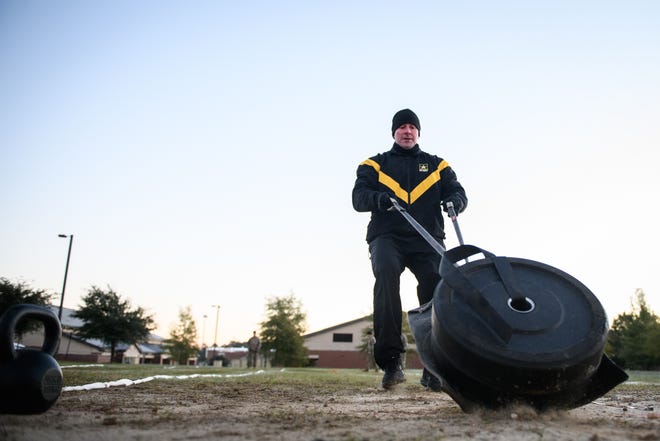Could the Army’s fitness test change again?

The Army Combat Fitness Test could change — again — if the Senate Armed Services Committee’s markup of next year’s defense budget is passed.
The final version of the 2024 National Defense Authorization Act still needs to make its way through both chambers of Congress before being signed by the president.
The committee approved its version of the National Defense Authorization Act on June 23.
Within the committee’s budget is a proposal to restore the Army Physical Fitness test as the test of record.
The APFT, which was in place since 1980, had three assessments — sit-ups, push-ups and running.
The Army started field testing an updated fitness assessment, the Army Combat Fitness Test, in 2019.
Soldiers from Fort Bragg, which is now Fort Liberty, were part of the initial field testing.
The Army Combat Fitness Test consists of six events, which include the maximum deadlift, the standing power throw, the hand-release pushup, the sprint/drag/carry, the plank and the two-mile run.
It became the official fitness test for regular Army soldiers in October.
Army officials have said the new test measures 10 physical fitness components, including muscular strength, aerobic capacity, flexibility, power, agility, balance, reaction time, coordination and speed.
According to the Senate Armed Services Committee’s proposal, restoring the former physical fitness test would require a two-year pilot program and a one-year waiting period before implementation.
What it took to change the test
Army officials originally planned for the Army Combat Fitness Test to replace the Army Physical Fitness Test by October 2020, but it was delayed due to the COVID-19 pandemic and concerns the certain new categories created a disadvantage for female soldiers.
Democratic Sens. Kirsten Gillibrand, of New York, and Richard Blumenthal, of Connecticut, sent a letter to the Senate and House armed services committees in October 2020 urging that the test be postponed.
The senators cited data and initial test scores in raising concerns about whether the test will create a gender gap or limitations for certain occupations that require less physical responsibilities.
Through the 2021 National Defense Authorization Act, Congress commissioned an independent review of the test by the RAND Corp., a research organization.
According to a news release from RAND Corp., passing rates ranged from 41% to 52% for enlisted women, versus 83% to 92% for men.
Some female soldiers found the leg tuck, an event that evaluated how many times soldiers could tuck their knees in while pulling themselves up on a climbing bar, difficult.
In March 2022, the Army announced it was eliminating the leg tuck and replacing it with the plank.
Army Combat Fitness Test eliminates leg tuck event, gets changed again
Request to delay new Army fitness test not deterring Fort Bragg soldiers
Gender neutral test?
The House Armed Services Committee has taken a different stance on the Army fitness test compared to the Senate Armed Services Committee.
The House committee is asking for “sex-neutral” fitness standards for combat soldiers.
The House Armed Services Committee is also seeking to be briefed by Jan. 1 about the impacts the Army Combat Fitness test “has had on recruitment and retention” along with “relevant data” and how the new test “is in compliance” with the 2023 defense budget.
The 2023 defense budget passed in December required the secretary of the Army to “establish gender-neutral physical readiness standards that ensure soldiers can perform the duties of their respective military occupational specialties.”
Staff writer Rachael Riley can be reached at rriley@fayobserver.com or 910-486-3528.


